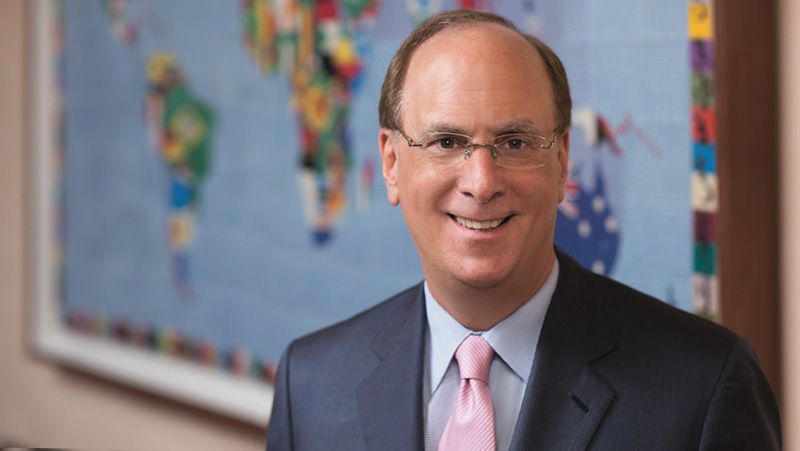Investors have again noted the absence of the term ‘ESG’ in Larry Fink’s annual letter, with the BlackRock CEO instead focusing on retirement concerns and how countries are using natural gas alongside renewables – something he has called “energy pragmatism” .
In his annual chair letter, released on 26 March, Fink emphasised a retirement crisis looms for the world’s population, skipping over the anti-ESG backlash the firm and several asset manager counterparts have seen over the past few years. Most recently, the asset manager’s vice chair, Mark McCombe, called the Texas State Board of Education’s decision to pull $8.5bn investment over BlackRock’s alleged ESG investing practices as “reckless” and “irresponsible”. It follows a stream of similar terminations of investment and states such as Texas prohibiting “investment in financial companies that boycott certain energy companies”.
Instead, Fink urged investors to “rethink retirement” amid an ageing population as a priority before addressing “energy pragmatism” in the second half of the letter.
See also: BlackRock’s Fink: ‘It’s not our place to be environmental police’
“I’m hearing more leaders talk about decarbonisation and energy security together under the joint banner of what you might call ‘energy pragmatism’,” he said.
Fink noted his visits to 17 countries last year meeting those responsible for powering homes and businesses.
“The message I heard was completely opposite to what you often hear from activists on the far left and right who say that countries have to choose between renewables and oil and gas. These leaders believe that the world still needs both. They were far more pragmatic about energy than dogmatic. Even the most climate conscious among them saw that their long-term path to decarbonisation will include hydrocarbons, albeit less of them, for some time to come.”
He used Germany as an example of making “enormous investments” in wind and solar power but sometimes still needs to rely on natural gas for “dispatchable power”.
“Germany used to get that gas from Russia, but now it needs to look elsewhere. So, they’re building additional gas facilities to import from other producers around the world.”
He also flagged Texas for making in-roads with renewable energy – the state now runs on 28% renewables, some 6% more than the US as a whole, he said, but “without an additional 10 gigawatts of dispatchable power, which might need to come partially from natural gas, the state could continue to suffer devastating brownouts”.
“In February, BlackRock helped convene a summit of investors and policymakers in Houston to help find a solution,” Fink added.
“Texas and Germany are great illustrations of what the energy transition looks like. As I wrote in 2020, the transition will only succeed if it’s ‘fair’. Nobody will support decarbonisation if it means giving up heating their home in the winter or cooling it in the summer. Or if the cost of doing so is prohibitive.”
Reaction
“The ESG industry cannot read Fink’s letter without acknowledging the continued absence of ESG,” commented Alexandra Mihailescu Cichon, chief commercial officer at RepRisk.
“However, much like last year, while the term may be missing, its underpinning themes are embedded throughout when discussing the energy transition, energy security and the issue of ensuring a fair transition. While the 2022 letter to shareholders and the 2023 letter to investors, focused on the ‘net zero transition’ and the ‘global energy transition’ respectively – 2024’s letter debuts Fink’s latest nomenclature – ‘energy pragmatism’.
“While there is clearly a nod to appease US stakeholders given the shift in debate around ESG throughout the letter, Fink stands by his widely acknowledged rhetoric of previous years when he summarises that ‘[t]he key point is: [t]he energy transition is not proceeding in a straight line’.”
Mihailescu added Fink has missed an opportunity to set out what will help in practice for investors navigating the business conduct and evolving ESG landscape.
“For investors to be truly pragmatic in navigating energy transition and security, they need customised metrics and fast data to empower them to make pragmatic decisions grounded in confidence – both to mitigate risk and seize opportunity. As we transition to a more sustainable economy, investors are better served by pragmatism, than by perfectionism.”
Meanwhile, Jessye Waxman, senior campaign strategist in the Sierra Club Fossil-Free Finance campaign, said Fink is right to emphasise retirement will be an even harder proposition 30 years from now, but expressed disappointment the letter fails to recognise “the climate crisis is one of the biggest drivers of financial instability and the diminished prospects for long-term savings”.
“BlackRock’s strategy to date has demonstrated a failure to grapple with its fiduciary responsibility to mitigate systemic risk,” Waxman said.
“BlackRock continues to promote an outdated all-of-the-above energy strategy – which it passes off as ‘pragmatism’ – that is accelerating the climate crisis and putting its clients’ long-term savings at risk. But ensuring a secure retirement in the decades to come requires taking action now to ensure economic and financial well-being, which necessitates preventing the worst impacts of climate change. BlackRock must adopt investment and stewardship practices that support real-world decarbonisation to pave the way for a future where stable retirement is viable.”








